At a time of increasing drought in Africa, initiatives are increasingly focusing on restoring degraded land and resisting water stress. And in the view of the African and international community, women could make a greater contribution to speeding up this process. But their views, their rights and their intellectual and physical potential must be taken into account. The World Day to Combat Desertification and Drought, to be celebrated on 17 June 2023 under the theme "Women's Earth. Women's rights" will be the ideal platform to launch this debate.
When it comes to desertification and drought, Africa has rapidly moved from a “worrying situation” to an “alarming situation”, with a major impact on sustainable development. According to a report (2021) by the World Meteorological Organisation (WMO), the number and duration of droughts have increased by 29% since 2000, compared with the previous two decades, putting more than 2.3 billion people under water stress. According to the same source, drought could affect more than three quarters of the world’s population by 2050.
Desertification is also a major problem affecting the planet’s ecological security, poverty eradication, socio-economic stability and sustainable development. The phenomenon is caused by unsustainable agriculture that depletes nutrients in the soil, mining, overgrazing and clear-cutting of land. “Today, the rate of degradation of arable land is estimated at 30 to 35 times the historical rate, while around two billion people depend on dryland ecosystems, 90% of whom live in developing countries”, says the UN.
Land restoration and drought resistance as response solutions
Failing to halt desertification and drought, which requires a whole range of parameters to be taken into account (recurrent rainfall, reducing bush fires, eliminating unsustainable agriculture, reducing mining and overgrazing, etc.), governments and organisations are increasingly focusing on restoring degraded land and resisting the effects of drought through actions such as reforestation and tree regeneration, soil buttressing through the use of sand fences shelter belts, woodlands and windbreaks, soil enrichment and hyper-fertilisation through planting, and farmer-managed natural regeneration (FMNR), which enables the growth of trees with germination capacity through selective pruning of shrub shoots. “Accelerating the restoration of one billion hectares of degraded land by 2030” was the only quantified objective in the final declaration published at the end of the fifteenth Conference of the Parties (COP15) to combat desertification, held from 9 to 20 May 2022 in Abidjan, the economic capital of Ivory Coast.
This decision follows a report published by the UN a few days before the start of the summit, which states that desertification affects 40% of the Earth’s land surface and is already affecting around half of humanity. Sustainable water management is also a way of restoring land and coping with drought, as well as harnessing unconventional resources such as wastewater, seawater and rainwater. Two major issues remain, however: the effectiveness of these actions and the role of women in their implementation.
Women and soil health: when legislation tends to minimise their role and make them invisible
The World Day to Combat Desertification and Drought, to be celebrated on 17 June, will focus on these issues, and in particular on the vital role played by women and girls in the health of the land, given that they often have no control over it. Hence this year’s theme, “Women’s land. Women’s rights”.
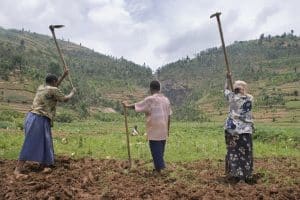
Women farmers in Rwanda©giulio napolitano/Shutterstock
In many regions, women and girls are still subject to discriminatory laws and practices that hamper their right to land and inheritance, as well as their access to services and resources. And when land degrades and water becomes scarce, women are often the hardest hit.
The study on “The differential impacts of desertification, land degradation and drought on women and men”, published in 2022 by the United Nations Convention to Combat Desertification (UNCCD), clearly shows that the disinheritance of the surviving spouse persists in 96 countries, where the legal regimes applicable to inheritance rights remain contradictory and/or are not clearly uniform. Women’s rights to inherit their husbands’ property are denied in 102 countries by customary, religious or traditional laws and practices. Furthermore, 103 countries do not criminalise the dispossession of property or the monopolisation of inheritance.
The study, conducted by international consultant Lorena Aguilar under the general supervision of Rockaya Aidara and Miriam Medel, also shows how this situation hinders women’s access to loans and credit, while restricting their access to extension services and training to respond to the effects of climate change in terms of drought-resistant crop varieties, irrigation technologies and a whole range of farming techniques. The lack of recognition of women as farmers and social acceptance of their involvement in certain agricultural activities also leads to their exclusion from decision-making spheres, information and services.
So when droughts take on the proportions of real disasters, technology takes on crucial importance in managing the risks. However, in many cases, early warnings do not reach women. Research shows that women have less access than men to weather forecasts, mainly because the ways and means of transmitting information are often not adapted to women (language barriers, written documents, workshops organised outside the community, timing of meetings). Women’s lack of participation and involvement affects their role in preparing effectively to combat drought.
Drought and land degradation also tend to increase the burden of unpaid domestic and care work taken on by women and girls. The resulting food shortages also affect the distribution of food within the family. Women tend to eat smaller portions or skip meals, leading to stomach pains, vomiting, weakness, diarrhoea and malnutrition. According to the United Nations Children’s Fund (UNICEF), women worldwide spend 200 million hours a year fetching water. In sub-Saharan Africa, for example, a round trip to fetch water takes an average of 33 minutes in rural areas and 25 minutes in urban areas. Drought-related migration increases women’s workloads and is likely to lead to a reduction in available resources and labour.
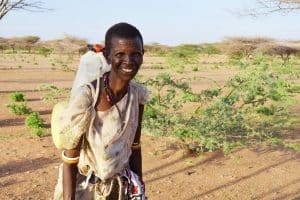
A woman fetching water in Kenya©Adriana Mahdalova/Shutterstock
Women who have to look after their families are not always in a position to make timely decisions about agriculture or to respond to the impact of drought, land degradation and desertification, or extreme weather events. “Yet they are important players in the global fight to reduce and halt land degradation”, says Ibrahim Thiaw, Executive Secretary of the UNCCD.
Putting women at the forefront of global efforts to restore land and resist drought is a necessity…
Equitable land governance and security of tenure are essential to enable women-led land restoration efforts, including the creation of community nurseries, the development of irrigation systems, and the establishment of apprenticeship programmes in land and water-related trades. The Uganda Rainwater Association (URWA), for example, has trained women suffering from the human immunodeficiency virus (HIV) and tuberculosis to build rainwater harvesting jars to cope with drought.
In Sudan, Zenab for Women in Development (ZWD) has developed an agricultural programme for Sudanese women farmers, believing that they can “change the game” to create resilient livelihoods, improving food security and household incomes. Women are trained in sustainable farming practices and provided with quality agricultural inputs and access to credit.
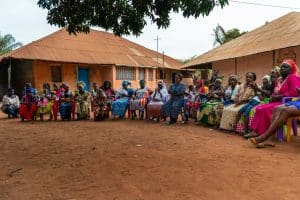
A women’s association in Guinea Bissau©TLF Images/Shutterstock
The study on “The differential impacts of desertification, land degradation and drought on women and men” also recommends promoting the equal participation of women and men in the processes and structures of the UNCCD, building the capacity of women’s organisations, regularly share information on parity, increase countries’ commitment to equal participation of women and men, and improve the inclusion of women, in all their diversity, and their contributions to analysis and decision-making on key political commitments.
It will also be necessary to strengthen and enforce legal protections for the land rights of vulnerable groups and women, and to ensure equal access to, use and control of land, forests and natural resources through improved technologies, mechanisms to facilitate acquisition, and gender-sensitive use and management of land and natural resources. It is also necessary to require financial mechanisms to include measures to improve women’s access to available financing.
Inès Magoum

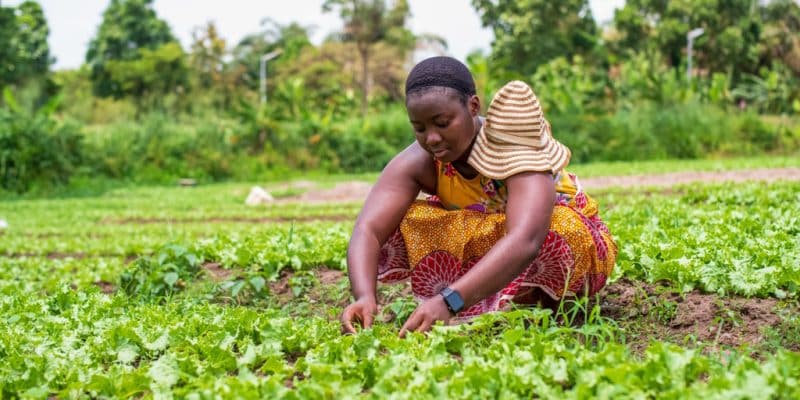
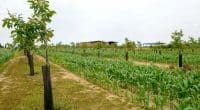





You must be logged in to post a comment.